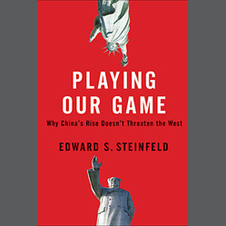Tuesday, November 2, 2010 | 10:30 PM EDT

National Committee Director Edward Steinfeld discussed his new book, Playing Our Game: Why China’s Rise Doesn’t Threaten the West (Oxford University Press, 2010), at a Jones Day program on November 2, 2010. In the book, Steinfeld explores the monumental economic and political ramifications of China’s integration into global production. By examining how contemporary Chinese enterprises actually engage the global economy and participate in a global division of labor, the book challenges the idea that Chinese firms are rising at their Western counterparts’ expense. It also challenges the claim that political change in China has lagged behind economic transformation. Steinfeld argues instead that the Chinese growth story is fundamentally about China’s internalization of the rules and practices of advanced industrial nations. China has grown not by conjuring up its own unique political-economic institutions, but instead by increasingly harmonizing with our own. The results within China – on the economic front as well as politically – have been nothing short of revolutionary.
Steinfeld’s current research focuses on two areas: the nature and development of innovative capacity in Chinese high-tech industry, and the expansion and regulation of China’s energy sector.
Dr. Steinfeld is an associate professor of political science at the Massachusetts Institute of Technology, director of the MIT-China Program and co-director of the MIT Industrial Performance Center’s China Energy Group.
Politics & Foreign Relations
Politics & Foreign Relations
Edward Steinfeld is associate professor in the MIT Department of Political Science and co-director (with Richard Lester) of the MIT Industrial Performance Center’s China Energy Group. Steinfeld’s research focuses on the political economy of contemporary China. In addition to a variety of academic articles, Steinfeld is the author of Playing Our Game: Why China’s Rise Doesn’t Threaten the West (Oxford University Press, 2010) and Forging Reform in China: The Fate of State-Owned Industry (Cambridge University Press, 1998). Steinfeld also edited (with Anthony Saich and Yasheng Huang) the book Financial Sector Reform in China (Harvard University, 2005). Steinfeld is the author of numerous articles in both academic and non-academic journals, including Comparative Politics, Political Studies, World Development, The Far Eastern Economic Review, The Washington Post, The Asian Wall Street Journal, and The South China Morning Post.
Steinfeld’s current research focuses on two areas: the nature and development of innovative capacity in Chinese high-tech industry, and the expansion and regulation of China’s energy sector. Steinfeld’s research team at MIT’s Industrial Performance Center in 2008 completed the first independent (non-governmental) nationwide survey of Chinese power plants, a study that examined areas spanning investment, operations, regulatory supervision, and environmental performance. Results from that survey were presented in Steinfeld’s May 2009 Energy Policy article (co-authored with Richard Lester and Edward Cunningham) “Greener Plants, Grayer Skies: A Report from the Front Lines of China’s Energy Sector.”
While a faculty member at MIT, Steinfeld has also served as a consultant to the World Bank, the International Finance Corporation, and a variety of both public and private sector organizations. Steinfeld currently serves on the board of directors of the National Committee on U.S.-China Relations.
